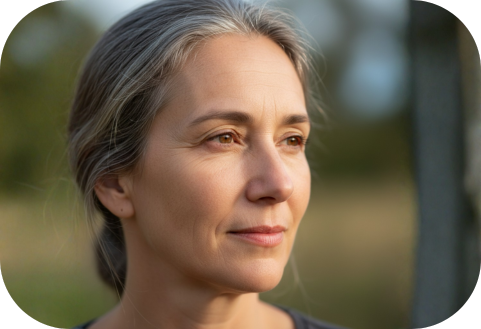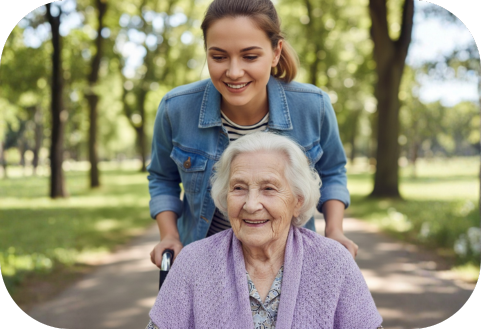Alzheimer’s Care for Seniors: How ReComune Makes a Difference?
Alzheimer’s disease is one of the most prevalent and challenging neurological conditions affecting seniors today.
Updated on: 26 Jan 2026

Caring for a loved one is one of the most selfless and noble acts a person can perform. It’s an expression of unconditional love, devotion, and compassion, often done quietly and tirelessly. Yet, behind this beautiful responsibility lies a deep emotional and physical toll that many caregivers face in silence. According to the study more than 60% of caregivers report feeling emotionally drained, while nearly 40% experience symptoms of depression or anxiety due to constant caregiving demands (ucp.org)
The (Cleveland Clinic 2023) defines caregiver burnout as a state of physical, emotional, and mental exhaustion caused by prolonged stress. It’s not just fatigue it’s the quiet erosion of energy, patience, and joy. Without deliberate self-care, even the most compassionate caregivers can lose sight of their own needs, leading to frustration, guilt, and declining health.
But here’s the truth: you cannot pour from an empty cup. Caring for yourself isn’t a sign of weakness it’s an act of courage and balance. When you prioritize your own well-being, you don’t take away from your loved one; you give them the best version of you calm, strong, and full of love.
Caregiver burnout is more than being tired. It’s a chronic state of stress, frustration, emotional depletion, and often a feeling that you have nothing left to give. Symptoms include fatigue, irritability, withdrawal, anxiety, depression, sleep disruption, and resentment (Cleveland Clinic).
When unaddressed, burnout can lead to serious health consequences, strained relationships, and diminished quality of care for your loved one.
These numbers underscore how real and serious caregiver burnout is and why prevention must be a priority.

Self-care is not a luxury it’s a lifeline for caregivers. It’s the foundation that sustains compassion, clarity, and resilience when caring for others becomes overwhelming. The caregivers who regularly practice self-care experience lower stress levels and better physical health. Simple acts like maintaining sleep, eating nutritious meals, setting boundaries, or taking short breaks are not indulgences; they’re essential tools for renewal (Mayo Clinic).
According to the (American Psychological Association), self-care helps caregivers prevent burnout, manage anxiety, and maintain emotional balance, ensuring they can continue to care with empathy rather than exhaustion. When you nurture your mind and body, you safeguard your ability to love deeply, respond patiently, and remain resilient in the face of challenges. Remember caring for yourself is not selfish; it’s an act of strength and responsibility toward yourself and those who depend on you.
Before burnout fully takes hold, the body and mind often send warning signals:
The earlier you respond, the easier it is to course-correct.

Isolation deepens burnout. Surround yourself with a scaffold of support:
Small, consistent acts of self-care can recharge you:
These aren’t indulgences; they’re emotional insurance.
Boundaries bring clarity and protection. Without them, you risk overextending yourself.

Taking a break is not abandonment it’s survival.
Your emotional well-being matters as much as your physical health.
Burnout takes a toll on the body. Protecting yourself physically helps your mental and emotional state.
Ask yourself: How will I feel about this in five years? Is this task worth the emotional cost? Holding perspective helps you make sustainable choices.
Throughout your journey, lean into language and thoughts that uplift, empower, and clarify your resolve. Words like resilience, compassion, clarity, renewal, boundaries, nourishment, hope, strength, balance, mindfulness, valued, and purpose deepen your emotional foundation.
Let your inner dialogue reflect your dignity: “I’m worthy of care. I deserve renewal. I can love deeply—and still protect my heart.”
| Time | Activity | Purpose |
|---|---|---|
| Early Morning | Gentle movement (stretch, walk) | Activate body, mood boost |
| Mid-Morning | Check-in with support group or a friend | Emotional recharge |
| Noon | Nourishing meal + short rest | Physical refuel |
| Afternoon | Delegate a task or take a short break | Prevent overwhelm |
| Evening | Mindful ritual (reading, reflection) | Mental calm |
| Night | Wind-down routine + sleep hygiene | Deep restorative sleep |
Adapt this to your schedule and needs – consistency matters more than perfection.

When you hold your emotional health in high regard:
Caring from a place of abundance is vastly more sustainable than caring from depletion.
Being a caregiver is one of life’s greatest acts of love but also one of its most demanding. You give your time, your patience, your energy, and your heart to ensure someone you love is safe and cared for. Yet, in this constant giving, it’s easy to forget something essential. Caregiver burnout doesn’t happen overnight. It builds quietly through missed meals, sleepless nights, skipped social moments, and the silent belief that your needs can wait. But the truth is, your well-being is the foundation of the care you provide. When you nurture your mind and body, you don’t just restore yourself you strengthen your ability to love and support others with patience, clarity, and compassion.